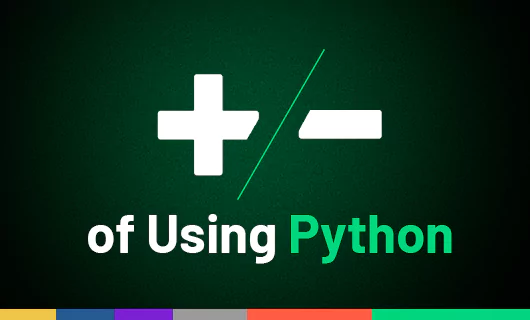In e-commerce, choosing the right technology stack when building online stores is crucial for success. Convenience is the key driver of consumer engagement, and it can be achieved only with a flexible, scalable, and versatile programming language, such as Python. Many other solutions are available for online website owners and developers; however, if you handle a large number of users and countless products, you need a stack that will ensure fast performance and provide interactive modules and detailed analytics, among other features. You need to invest in a Python development service for your e-commerce site.
Selecting the correct programming language for your e-commerce website requires careful consideration of its benefits. This article will explore why Python is an excellent choice for online business development.
Why Choose Django Framework for Python E-commerce Development?
When it comes to building e-commerce applications, some of the best-fit frameworks are Django, Pyramid, TurboGears, and Web2Py. Python, an open-source language, is known for its ease of modification, use, and distribution. It also provides extensive standard libraries that can enhance the product or introduce new features without problems.
Django, as a Python web application framework, offers prewritten bits of code that create reusable building blocks for a rapid app or page creation without the need to start from scratch. When combined with Django, Python becomes even more efficient, enabling faster development of e-commerce websites.
Scalability and Customizability
One reason for Python’s popularity is its scalability. In the ever-expanding world of online shopping, e-commerce platforms must ensure speed, accuracy, and seamless growth. Thanks to its robust coding, the Python Django website can simultaneously handle a high volume of user requests. It also supports vertical and horizontal scaling, making it easy to boost the performance and speed of an e-commerce website without any hindrance.
Popular Django e-commerce frameworks include Oscar, Saleor, Django-SHOP, and Shuup. For those interested in product personalization, a solution like Django Oscar is perfect. It offers features such as payment gateway integration, multi-currency, and multi-language support; it can also handle large catalogs with over 20 million products, allow for PDF invoice generation, enable dynamic categories, and support complex order processing, including split payment orders, multi-batch shipping, and order status pipelines.
Integration with Third-Party Tools
The Python Django combo provides multiple avenues for integrating third-party tools to improve e-commerce sites’ performance via API or library integration and a selection of plugins and extensions. These options facilitate the implementation of payment gateways and smooth collaboration with shipping providers, inventory management systems, and other external services, expanding the capabilities of the e-commerce platform. In addition, while Django’s vast ecosystem of plugins and extensions offers pre-built functionalities tailored to e-commerce needs, custom code can be written for specific requirements.
Notably, Django offers the capability to interact with the Shopify API. Python can be utilized to develop custom apps or extensions for Shopify, automate processes, analyze data, and perform various other functions to efficiently operate and manage an online store on the Shopify platform.
Speed and Efficiency
Django’s speed and efficiency are attributed to its middleware, ORM, and caching mechanisms. Middleware is a plugin used by the application to perform different functions, the ORM provides an efficient way to interact with databases, and caching mechanisms store frequently accessed data in memory, reducing overhead and improving response time.
Django’s cache system is known for saving dynamic pages effectively, reducing the need for repetitive calculations with each request. With various levels of cache granularity, Django provides convenient options for optimizing performance and improving efficiency.
User-Friendly
Django is well-known for its developer-friendly approach that minimizes redundant coding and promotes component reuse. Moreover, since the primary focus in building an attractive e-commerce website is to meet user needs, it can be achieved through a user-friendly interface that presents product details in a straightforward manner.
Large Community and Library Support
Django boasts a large and skilled community of developers, making it straightforward to find experienced coders. Moreover, it allows developers to harness the power of popular Python libraries such as TensorFlow, PyTorch, Theano, Keras, and Selenium. This eliminates the need for extensive research and enables efficient and rapid development.
Advanced Features
Django offers a wide range of advanced, unique features that can enhance the development of web applications. Some of the most notable ones include:
- Django REST framework – a library or toolkit used to build RESTful Web APIs
- Custom template filters and tags – Django has built-in tags and filters for designing the presentation layer, but you can create custom tags and filters using Python to add functionality not included in the core set of templates.
- Signals – They facilitate coordination among different application components.
- Localization – Developers and template authors can decide which elements of their applications should be translated or adapted to different languages and cultures.
If you require additional functionality for a complex application, Django offers an extensive library of over 4,000 packages that can be utilized for tasks such as profiling, testing, and debugging.
Robust Security
Python includes built-in security features that mitigate the risks of SQL injection and phishing attacks in e-commerce platforms. Additionally, its user authentication system ensures a secure approach to managing user accounts and passwords.
Multi-Platform Support
Django allows you to create applications compatible with Windows, Mac, and Linux operating systems, enabling your app to run seamlessly across different platforms. Moreover, it supports managing large databases effectively and aids in their appropriate use in projects. Developers can utilize multiple databases concurrently for their projects.
Characteristics of E-commerce Projects Suitable for Python Django Framework
While using a ready-made e-commerce platform may be suitable for creating a simple website without coding knowledge, when you only need features that already exist in the platform and prefer to use pre-designed templates; expanding businesses will choose to install Django. Unless you want to create small websites, you will select custom development with Python, which offers full control over designs and functionality, the potential for large-scale and high-performance apps, and platform ownership.
The aforementioned scalability and user-friendliness are crucial when considering web development with Python, but there are more reasons for choosing this language. Python e-commerce website ensures efficient geolocation integration functionality, allowing users to filter products and services based on location, enhancing the user experience, and boosting sales. E-commerce sites built with Python often offer specialized delivery choices for customers, such as flat-rate and multi-level shipping.
Django is a popular choice for building robust e-commerce websites with features like handling different types of products, payment processing, user roles, subscriptions, and industry-specific needs. It is also flexible and scalable and can be changed to fit your needs.
So if you, like many other businesses worldwide (including Instagram, YouTube, The Washington Post, Mozilla, Spotify, and Prezli), choose Python, specifically the Django framework, you can be sure that you made the right choice for your e-store.

Comparison of Python with Other Programming Languages for E-commerce
Choosing the right stack is crucial when developing noteworthy e-commerce solutions. The options are many, yet Python remains one of the most in-demand solutions used in e-commerce. If you’re interested in back-end development services for your online store, you should know what differentiates the most popular programming languages.
Python vs. Java
Python and Java are widely recognized as powerful and widely used programming languages. As a compiled language, Java is generally known for its speed and efficiency, surpassing Python’s performance. On the other hand, Python, an interpreted language, boasts a simpler and more concise syntax than Java, allowing developers to accomplish similar tasks with fewer lines of code. While Java may be faster, Python is often regarded as easier to learn due to its simplicity.
Python vs. PHP
Python is a versatile programming language used for web and desktop applications, as well as complex scientific and numeric applications. On the other hand, PHP is primarily used for developing dynamic or static websites, web content management systems, e-commerce, and GUI-based applications. When comparing e-commerce Python and PHP solutions, we notice some differences. PHP is famous for being time and cost-efficient. Python, on the other hand, is lauded for its ease of use, extensive library support, and versatility in interacting with various platforms and languages.
Python vs. Ruby
Python has a concise and clean syntax, which requires developers to write less code. Moreover, it provides a larger and more mature ecosystem with libraries for various domains and is known for better performance and scalability. On the other hand, Ruby has a more flexible and expressive syntax but lacks Python’s community support and is sometimes criticized for slower execution speed.
Python vs. JavaScript
Regarding the virtual environment and application, Python is a general-purpose language for web development, scientific computing, data analysis, and machine learning. On the other hand, JavaScript is primarily used for front-end technologies development, creating dynamic web pages, and adding interactivity to websites. Although JS has gained popularity because almost every software developer knows it least to a certain extent, Python scores higher in vitality and scalability.
Use Cases of Python in E-commerce Development
Python and its web development Django framework can be used to support many different functionalities of online shops. For example, a multi-vendor application is a software system that enables multiple vendors or sellers to operate within a unified platform or marketplace. These applications typically offer functionalities for vendors to create and manage their products, handle inventory and orders, process payments, interact with customers, and track their sales and performance. Python can be utilized to develop the back-end logic and functionality of the multi-vendor application.
Custom E-commerce Platforms
Custom development is necessary if your business requires specific functionality or unique design elements to align with your brand. It also opens up opportunities to leverage artificial intelligence and machine learning, currently among the top technology trends in the retail industry.
Machine learning has several critical use cases in e-commerce, including personalized recommendations based on user behavior, image recognition for visual search, prevention of fraudulent payments, and speech recognition for understanding customer feedback. And Python takes a leading position as the language used in ML.
Integration with Payment Gateways
Integrating payment gateways into a Django-based shop system allows for secure and seamless online transactions. Payment gateways are third-party services that make it easy for the buyer and seller of an online purchase to send and receive money. As mentioned before, the Django framework integrates seamlessly with third-party e-commerce applications enabling smooth transactions and enhancing the overall user experience of their e-commerce application.
Inventory Management
Wagtail is a popular open-source content management system (CMS) built on top of the Django web framework, written in Python. It provides a flexible and powerful platform for creating websites and web applications, including features such as content authoring, publishing workflows, and user permissions.
With its extensible architecture, Wagtail CMS can also be used for building custom inventory management systems. This allows the CMS user to define data models, implement views and templates, user authentication and permissions, search and filter, and test and optimize the system for maximum performance.
Order Management
Python with Wagtail can be used to create a customizable order management system for e-commerce websites. Creation of such a system requires defining a product model, implementing order management views, user authentication and permissions, payment gateway integration, order tracking and reporting, search, and filtering, integrating with Wagtail CMS, and thorough testing and optimization.
Customer Relationship Management (CRM)
A CRM system is a powerful tool to enhance a company’s interactions with its customers. It goes beyond mere data storage and assists managers in closing deals by providing crucial insights, such as reminders for important calls and tracking correspondence, documents, and communication history. With its popularity, flexibility, reusable modules and templates, and extensive libraries, Python is a secure, time and cost-efficient solution when building an e-commerce CRM.
Recommendation Engines
Python’s machine-learning capabilities come in handy for product recommendations. Based on product browsing, adding and removing from a cart, and purchase history, Python can create personalized product recommendations, a solution that most websites value as it greatly enhances the customer experience.
Real-time Analytics
With Python installed, you gain access to various analytics options with its rich ecosystem of libraries and tools. These options include data analysis, machine learning, data visualization, statistical analysis, natural language processing (NLP), data visualization and dashboarding, big data analytics, time series analysis, and network analysis.
For example, Wagtail’s dashboard includes built-in analytics and reporting features that provide insights into website usage, visitor statistics, and other performance metrics. This allows administrators to track the website’s performance and make data-driven decisions.
Choosing Python for E-commerce Development
If we said it once, we said it a hundred times – Python is an excellent choice for e-commerce projects that require versatility, scalability, and ease of use. Even considering Django’s friendly architecture, however, creating an online shop using Python without basic knowledge of coding can prove challenging. Therefore, we encourage you to discuss your project with a trusted partner, such as Scalo software development company, to maximize results.
Conclusion
With an abundance of programming languages and frameworks, it’s hard to choose the right stack for your specific project. We are strong advocates of Python and frameworks that use this particular language. We hope that this article explains the reasons behind our stand. Contact us if you want to know more about Python development.





